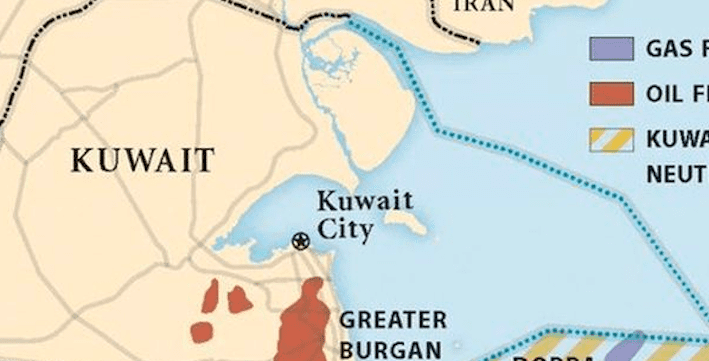(A map from Kuwait’s oil ministry showing the Arash/Durra (Dorra) oil and gas field near the tip of the Persian Gulf.)
Kuwait insists a disputed oil and gas field in the Persian Gulf is only shared with Saudi Arabia despite Iran’s claims, but also invited the Islamic Republic for talks.
Kuwait’s foreign ministry said in a statement issued Monday, “The State of Kuwait and the Kingdom of Saudi Arabia… alone have exclusive rights to the natural wealth in the Al-Dorra field.”
However, it also renewed its invitation to Iran for talks over their sea borders after Tehran said last week that it was ready to start drilling in the disputed offshore field — called Arash in Iran and Durra or Dorra by Saudi Arabia and Kuwait.
“The State of Kuwait renews its invitation to the Iranian side to start negotiations on the demarcation of the maritime borders,” the Kuwaiti foreign ministry declared.
Last year, the two Arab neighboring countries agreed to jointly develop the field, which was discovered in 1967 and is estimated to have a total proven reserves of around 310 million barrels of oil and 20 trillion cubic feet of gas.
Saudi Aramco Gulf Operations Company signed a Memorandum of Understanding in December with Kuwait Gulf Oil Company (KGOC) to develop the joint gas field, Saudi state news agency (SPA) reported.
The development aims at producing 1 billion cubic feet of gas and 84,000 barrels of liquefied gas per day, according to the Kuwaiti state news agency.
In the dispute that dates back several decades, Iran claims any development without its consent breaks international laws, saying that 40 percent of the field is located in its territorial waters.
Mohsen Khojsteh-Mehr, the managing director of the National Iranian Oil Company, said last week that “there is full preparation to start drilling in the joint Arash oil field”.
“Considerable resources have been allocated to the board of directors of the National Iranian Oil Company for the implementation of the development plan for this field,” he said in remarks carried by Iranian state media.
The dispute over the Dorra field stretches back to the 1960s, when Iran and Kuwait each awarded an offshore concession, one to the Anglo-Iranian Oil Company, the forerunner to BP, and one to Royal Dutch Shell. The two concessions overlapped in the northern part of the field, whose recoverable reserves are estimated at some 220 billion cubic meters (seven trillion cubic feet).
Saudi Arabia is also a part of the dispute because it shares with Kuwait maritime gas and oil resources in the area.
Last week, Saudi Arabian Oil Company and TotalEnergies signed an$11 billioncontract to build a petrochemicals complexnear the offshore field.
Criticizing the Iranian government’s inaction vis-a-vis the project, Chairman of the Board of Directors of the Association of Iranian Oil and Gas Drilling Companies Hedayatollah Khademi told ILNA news website in Tehran on June 25, “It seems that we have surrendered the joint fields to the neighbors.”
Highlighting the fact that Riyadh has significantly developed and extracted from joint fields such as Arash/Durra, Farzad-A, Farzad-B, and Forouzan despite the fact that Iran dug the first exploratory wells in the fields., he said, “We have not done anything,” accusing the Iranian government of sitting idle in the face of the encroachment.

